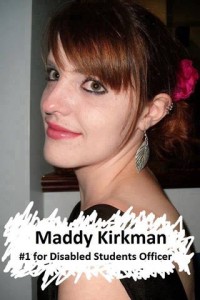 The NUS Disabled Students’ Conference was held a few weeks ago in Manchester. Maddy Kirkman was voted in as NUS UK Disabled Students’ Officer.
The NUS Disabled Students’ Conference was held a few weeks ago in Manchester. Maddy Kirkman was voted in as NUS UK Disabled Students’ Officer.
Congratulations on being voted in as the new disabled students’ officer. Did you expect to be voted in?
I was hoping to be voted in. I had a really strong opponent in Graham Brittles and he made a really, really, good speech and he’s a really fantastic activist.
What swung it for you?
I think that my policies were more about Society in general. Disabled people at the moment are facing massive problems in the political arena and in society in general. Graham’s policies were very much around education, which is incredibly important but at this moment in time, I think the movement feels that we need to be looking at the General Election and anti-cuts work. Graham and I were both talking about representation because there are a lot of Students’ Unions affiliated with NUS that don’t have any disability representation – so that’s something we really agreed on.
Are the issues you’ve outlined political or social?
Both. I think that politicians are definitely accountable for those things; they’re the ones that are making the decisions.
In making those decisions, are they making the problems?
Yes. Absolutely, but I think that Society makes it far too easy for them to get away with it. So a lot of the cuts that are taking place at the moment that are affecting disabled people are being done for financial crisis reasons, but there’s absolutely no logic to hitting disabled people so hard. We’re not the ones that take the most out of the system and we could contribute so much more. A lot of the things that we’re pushing for would help the economy.
Of course cuts, in part, are necessary aren’t they?
I think there’s a huge amount of inefficiency in government that needs to be dealt with before we start looking at social security, healthcare and education that we fought for in the past. Society understood that they were important and that they were an investment and when we talk about cutting them; we talk about cutting back on our future and cutting back on peoples’ ability to live normal lives. I think that as a society we should fight against that.
Some people might accuse you of being adversarial instead of political
In terms of being adversarial – I didn’t start this! I said in my hustings speech that our rights aren’t threatened, they’re being openly attacked! That’s the case in government, in media, in academic institutions, and we have to give a strong response. We can’t lie down and take this. We fought for these things before and now that they are being attacked. We have to fight to keep them. I think that strength and resilience is the only way to approach it.
Are you looking for solutions based on positive discrimination that make disabled students immune from cuts?
I think quotas can be a problem because we want disabled people to be treated on merit rather than being part of a tick-box exercise. What we want to see is social change that creates a level playing field. If there was a level playing field in place in employment and education there would be no need for quotas. Quotas are quite demeaning for disabled people.
I think the two ticks system is quite a good system because the ensured interview is a really good way of giving a disabled person an opportunity to show their value in a way that might not be obvious on an application form or a CV. It’s that kind of system I’m in favour of.
Do you think that enough disabled people know about the Disabled Students Union?
Lots and lots do, but not enough. There are NUS affiliated institutions that don’t have any disability representation and that’s a real problem for them at a local level and for us at a national level. We’ve got one of the most vibrant campaigns in the NUS at the moment and that’s really exciting. We’ve got some fantastic activists coming through (but) we need to be out there doing more.



